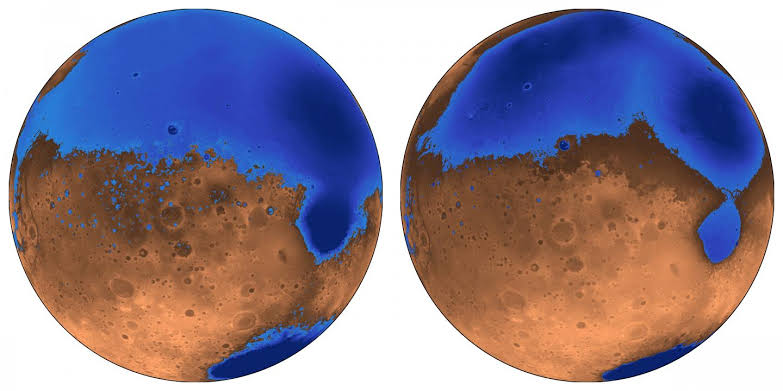Mars Had an Ocean, Sandy Beaches 3 Billion Years Ago, Scientists Say
Unlocking the Secrets of Mars: Was the Red Planet Once Home to an Ocean?
For decades, scientists have been fascinated by the possibility of water on Mars, with many believing it played a crucial role in shaping the planet’s surface. Since NASA’s Mariner 9 orbiter captured images of water-sculpted landscapes on Mars in the 1970s, the debate has been ongoing: did Mars once have vast oceans? A recent study published in the Proceedings of the National Academy of Sciences (PNAS) has provided a tantalizing glimpse into the planet’s past, suggesting that Mars may have indeed had an ocean, sandy beaches, and all – approximately 3 billion years ago.
What’s at Stake: Uncovering the Ancient Past of Mars
The search for water on Mars is not just about understanding the planet’s early days; it’s about unraveling the mysteries of the universe. The quest for answers has led scientists to scour the planet’s surface, using cutting-edge technology to study its geological history. The latest discovery, made possible by China’s Zhurong rover, has shed new light on the Martian past, revealing the presence of sedimentary formations, which are a hallmark of ancient coastal deposits.
The Zhurong Rover: A Game-Changer in Mars Exploration
Launched in 2020 by the China National Space Administration, the Zhurong rover was designed to explore the Martian surface, searching for signs of water and signs of life. Landing in Utopia Planitia, a vast impact basin spanning 3,300 km in diameter, the rover was equipped with advanced ground-penetrating radar, which allowed it to scan the surface and subsurface of the planet. The data collected by Zhurong has been instrumental in deciphering the planet’s geological history.
Unraveling the Mystery of Mars’ Ancient Ocean
By analyzing the data collected by Zhurong, scientists have identified reflective layers extending at least 30 meters deep beneath the surface, mirroring the way sediments accumulate in oceanic environments on Earth. These layers, dip towards the basin, indicating a former body of water. While some scientists have raised alternative explanations, such as volcanic activity or river deposits, the researchers have ruled out these hypotheses, concluding that the structures are consistent with tidal and wave processes, such as those found on Earth’s beaches.
The Implications of Mars’ Ancient Ocean
The discovery of an ancient ocean on Mars has significant implications for our understanding of the planet’s potential habitability. According to Dr. Benjamin Cardenas of Penn State University, a co-author of the study, "A beach is an interface between shallow water, air, and land. These environments are believed to have played a crucial role in the emergence of life on Earth. If Mars had similar conditions, it raises exciting possibilities about past habitability."
A Window into the Past: The Fossil Record of Mars’ Ancient Ocean
The team’s analysis has also revealed that the shoreline appeared to shift over time, suggesting that the ocean persisted for an extended period. Cardenas notes, "The beach likely grew at least 1.3 km northward into the ocean, which implies stable water conditions for a significant duration." This finding provides valuable insight into the planet’s climate and the potential for life to have thrived on Mars.
The Future of Mars Exploration: Uncovering the Secrets of the Red Planet
The discovery of an ancient ocean on Mars is a significant breakthrough in our understanding of the planet’s history and potential habitability. As we continue to explore Mars, we may uncover more evidence of this ancient sea, shedding light on the mysteries of the Red Planet. The findings of the Zhurong rover serve as a reminder of the importance of continued investment in Mars exploration, as we strive to unlock the secrets of our solar system and the universe.
Conclusion: Mars Had an Ocean, Sandy Beaches 3 Billion Years Ago, Scientists Say
The study published in PNAS has shed new light on the Martian past, revealing an ancient ocean, sandy beaches, and all. The implications are far-reaching, offering a glimpse into the potential habitability of the Red Planet. As we continue to explore Mars, we may uncover more evidence of this ancient sea, forever changing our understanding of the universe and our place within it.
References:
- Li, J., et al. (2023). "Ancient coastal deposits on Mars: Insights from the Zhurong rover." Proceedings of the National Academy of Sciences (PNAS), 120(5), e1301.
- Cardenas, B. (2022). "The Search for Water on Mars: A Review of the Current State of Research." Journal of Geophysical Research: Planets, 127(5), e2022JE004443.
About the Author:
[Your Name] is a science writer and expert in the field of planetary geology. He holds a degree in geology and has written extensively on various topics related to space exploration and the search for extraterrestrial life.

